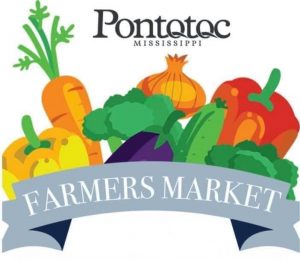OXFORD, Miss. – The University of Mississippi is among nine colleges and universities nationally that have been awarded funding in the third round of the Acceleration Fund, which supports climate action activities by educational institutions.
The awards were announced Thursday (April 21) by Second Nature, a nonprofit committed to accelerating climate action in, and through, higher education. The Acceleration Fund was introduced at the 2020 Higher Education Climate Leadership Summit, and funding for this round of grants comes from an anonymous foundation.
The university will receive $10,000, which will help strengthen cooperative programs in northeast Mississippi through M Partner, a community engagement initiative that pairs university resources with projects in partner communities.

UM student Molly Archer, a participant in the Catalyzing Entrepreneurship and Economic Development Initiative, created the logo for the Pontotoc Farmers Market.
“This grant from Second Nature validates the outstanding work that this program is able to accomplish, and will make a valuable contribution to northeast Mississippi,” said Noel Wilkin, UM provost and executive vice chancellor for academic affairs. “M Partner is able to directly benefit the citizens of the state by assisting communities in implementing meaningful improvements that benefit their citizens.”
Specifically, the money will go to fund projects with two partner organizations, the M.B. Mayfield Museum in Ecru and the Pontotoc Farmers Market, said Laura Martin, M Partner director and associate director of the McLean Institute for Public Service and Community Engagement.
Other institutions that were awarded funding in this round are California State Polytechnic University Humboldt, California State University at Monterey Bay, California State University at Sacramento, Chatham University, University of Arizona, University of California at Los Angeles, University of Illinois at Chicago and Virginia Wesleyan University. The selected institutions shared $100,000 in awards.
“We are thrilled and grateful to the Acceleration Fund for their support of our community-engaged programs,” said Josh Gladden, UM vice chancellor for research and sponsored programs. “The work these funds will support is a great example of the kind of partnerships envisioned by the M Partner program.”
In Ecru, the funds will be used for a sustainable landscaping plan and logo design at the M.B. Mayfield Museum, which will feature native plants that Mayfield, an African American folk artist, used to mix his own paints. Several UM departments are working with the M.B. Mayfield Foundation to prepare exhibits and establish the museum focusing on Mayfield, who participated in art classes at the university in the 1950s from a broom closet.
“The interpretative garden that it funds will be a reminder of M.B. Mayfield’s connection to Mississippi’s natural gifts of clay, soil and plants, the materials he used to paint and create sculpture in his early years,” said Jeannie Thompson, the museum’s director.
Another portion of the grant will be used in Pontotoc to create a summer internship at the Pontotoc Farmers Market. There, an Ole Miss student will conduct outreach to the Spanish-speaking community, promote the use of SNAP benefits and matching incentives to purchase local produce, and study risks to the regional food system.
“The market will use the funds to expand access to locally grown and produced foods by increasing the buying power of our SNAP recipients,” said Julia McDowell, director of the Pontotoc Farmers Market.
“With the support of Second Nature, our market can further its goal of fewer food miles, no long-distance shipping, no chemicals to simulate the ripening process, no cooler storage and reduced packaging, while supporting producers who make environmentally conscious choices on the farm.”
Both grants reflect the university’s commitment to helping improve life in communities across the state, Chancellor Glenn Boyce said.
“We’re pleased how Second Nature’s Acceleration Fund initiative will help the University of Mississippi support and advance our community engagement work through our M Partner program,” Boyce said.
“Our collaborations with community partners are incredibly important to us, and we look forward to witnessing the impact this work will have on quality of life and how it will positively impact these communities and the state.”